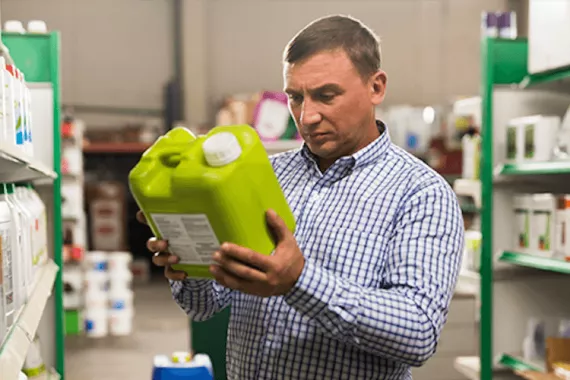
Case Overview
Glyphosate is one of the most widely used herbicides in the world, but ongoing research and regulatory debate continue to examine one critical question: Does glyphosate cause cancer? Scientific bodies such as the International Agency for Research on Cancer (IARC) and other regulatory agencies continue to examine its cancer risk.
Key takeaways about glyphosate cancer
- Reports have examined the apparent glyphosate and cancer link, though various regulatory agencies have reached conflicting conclusions.
- Exposure may occur through food, air, water, or skin contact and may be linked to non-Hodgkin lymphoma and other cancers.
- Thousands of lawsuits allege glyphosate manufacturers Monsanto and Bayer failed to warn about cancer risks linked to glyphosate-based products like Roundup.
What is glyphosate used for?
Glyphosate is an herbicide used to control a wide variety of grasses and broadleaf weeds. It was first introduced commercially in the 1970s. It quickly became a staple in U.S. agriculture because it is efficient and cost-effective.
Glyphosate is the active ingredient in Roundup products. Roundup's manufacturer, Monsanto, a Bayer subsidiary, also has a line of herbicide-resistant crops. These "Roundup Ready” crops resist glyphosate’s effects, allowing them to remain unharmed when farmers spray to eliminate surrounding weeds. Roundup Ready crops include genetically modified plants like corn, soybeans and cotton.
Beyond large-scale agriculture, glyphosate is also used in:
- Forestry management to clear undergrowth and unwanted vegetation
- Residential landscaping and lawn care products
- Public spaces such as parks, playgrounds, and golf courses
- Utility corridors and roadsides to control plant growth
Glyphosate is very widely used. This has raised concerns over the pesticide's effect on public health. Researchers and regulators continue to examine the impact and make changes.
Where is glyphosate found today?
Glyphosate is commonly found in the environment due to its persistence and heavy application. Residues have been detected in:
- Air samples following recent herbicide applications
- Rainwater in some rural and suburban areas
- Soil and groundwater near agricultural fields
Additionally, food contamination is a growing concern. Testing by consumer advocacy groups and government agencies has found glyphosate residues in:
- Breakfast cereals and oat-based products
- Fruits and vegetables
- Organic products, because of cross-contamination
- Packaged and processed foods
The U.S. Food and Drug Administration (FDA) and other global agencies monitor glyphosate levels. But critics argue that existing safety thresholds may underestimate long-term exposure risks.
Glyphosate in Roundup
Roundup, produced by Monsanto, which was acquired by Bayer, is the most recognized glyphosate-based product on the market. It has been sold for decades and marketed as a safe, easy-to-use solution for weed control.
However, mounting Roundup lawsuits allege that Monsanto misled consumers by failing to warn them about Roundup’s potential to cause cancer. Court documents and internal communications introduced in litigation suggest the company may have downplayed or disputed risks linked to glyphosate exposure.
How glyphosate exposure affects human health
Glyphosate can enter the body through skin contact, inhalation or ingestion of contaminated food or water. Once absorbed, it may interfere with key biological systems that regulate cell growth, DNA repair and hormone balance.
Studies have shown potential health impacts, including:
- DNA damage, including chromosomal breaks and mutations
- Endocrine disruption, affecting hormone-regulated processes
- Gut microbiome changes, potentially affecting immunity and digestion
- Inflammation, which plays a role in cancer development and chronic disease
- Oxidative stress, which can damage cells and tissues
These biological disruptions may not lead to immediate symptoms. In many cases, there is a long latency period between exposure and disease onset. This makes it harder to identify glyphosate as the source of harm until years later.
Does glyphosate cause cancer?
The International Agency for Research on Cancer (IARC), part of the World Health Organization, classified glyphosate as a “probable human carcinogen” as far back as 2015.
Other agencies, including the U.S. Environmental Protection Agency (EPA) and European Food Safety Authority (EFSA), have taken a more cautious stance. In 2020, the EPA concluded that glyphosate is “not likely to be carcinogenic to humans” under normal use conditions. But that finding has faced scrutiny from scientists and public health advocates.
Several countries, including France, Germany and Vietnam, have moved to restrict or phase out glyphosate products. In Canada, the Pest Management Regulatory Agency (PMRA) continues to review the chemical’s safety profile.
These conflicting conclusions have fueled both public confusion and legal battles over whether glyphosate causes cancer and what companies like Monsanto knew about those risks.
What cancers are linked to glyphosate exposure?
Glyphosate has been most strongly associated with non-Hodgkin lymphoma, a cancer that originates in the body’s lymphatic system, with forms including B-cell and T-cell lymphoma. However, research suggests other cancers may also be linked to glyphosate exposure, including leukemia.
These cancers may be biologically influenced by the same mechanisms that are triggered by chronic glyphosate exposure, such as DNA damage and immune system suppression.
Non-Hodgkin lymphoma symptoms
Non-Hodgkin lymphoma symptoms can vary from person to person. But they often include:
- Abdominal discomfort or fullness
- Fatigue
- Fever or chills
- Night sweats
- Swollen lymph nodes in the neck, armpit, or groin
- Unexplained weight loss
These signs may develop slowly, which may lead to a delay in diagnosis. NHL can also be hard to diagnose because its main symptoms overlap with many less serious conditions.
Glyphosate cancer lawsuits
Lawsuits against Monsanto/Bayer for glyphosate exposure have surged in recent years. Plaintiffs claim that glyphosate-based herbicides caused them to develop cancer and that the company failed to provide adequate warnings about the risks.
These cases have been consolidated into multidistrict litigation (MDL) in the U.S. District Court for the Northern District of California, which centralizes pretrial proceedings to improve efficiency. As of early 2025, thousands of plaintiffs remain in active litigation. Some key jury verdicts have resulted in substantial financial awards, validating claims that the way Monsanto/Bayer marketed the product was deceptive.
Additionally, numerous Roundup settlements have been reached, though Bayer continues to deny wrongdoing. Ongoing litigation could shape the future of chemical labeling laws and industry regulations.
Our toxic exposure litigation experience
Motley Rice has a history of representing individuals and communities harmed by toxic substances, including agricultural chemicals, industrial pollutants, and consumer products. Our attorneys have taken on some of the largest chemical manufacturers in the world, helping people seek justice for the serious health effects tied to corporate negligence.
In addition to the Roundup lawsuit addressing glyphosate exposure, our attorneys have played a leading role in litigation involving:
- Asbestos exposure and mesothelioma
- Paraquat herbicide and its apparent link to Parkinson’s disease
- PFAS “forever chemicals” in drinking water and firefighting foam and firefighter bunker gear
These cases often require scientific and medical knowledge and experience, multidistrict coordination, and persistence against powerful defendants.
If you or a loved one has been diagnosed with a serious illness that may be linked to toxic exposure, we can help evaluate your options.
What is glyphosate used for?
Where is glyphosate found today?
How glyphosate exposure affects human health
Does glyphosate cause cancer?
What cancers are linked to glyphosate exposure?
Glyphosate cancer lawsuits
Our toxic exposure litigation experience
- Sources
- American Cancer Society. Signs and Symptoms of Non-Hodgkin Lymphoma | American Cancer Society.
- ConsumerNotice.org. Glyphosate in Food: Avoid These Contaminated Products.
- Environmental Working Group. More Than 80% of U.S. Children’s Urine Contains Toxic Weedkiller.
- International Agency for Research on Cancer. IARC Monographs Volume 112: evaluation of five organophosphate insecticides and herbicides.
- Law360. Monsanto Roundup Cancer Suits Centralized In Calif.
- Mayo Clinic. Non-Hodgkin’s lymphoma.
- National Institutes of Health. Systematic review and meta-analysis of glyphosate exposure and risk of lymphohematopoietic cancers - PMC.
- NPR. Safe Or Scary? The Shifting Reputation Of Glyphosate, AKA Roundup.
- U.S. Environmental Protection Agency (2020). Glyphosate | US EPA.
Start Your Motley Rice Consultation in Simple Steps
Submit Information
Call us or fill out our online form with the details of your potential case.
Case Review
Our team reviews your information to assess your potential case.
Case Consultation
Talk with us about next steps.


